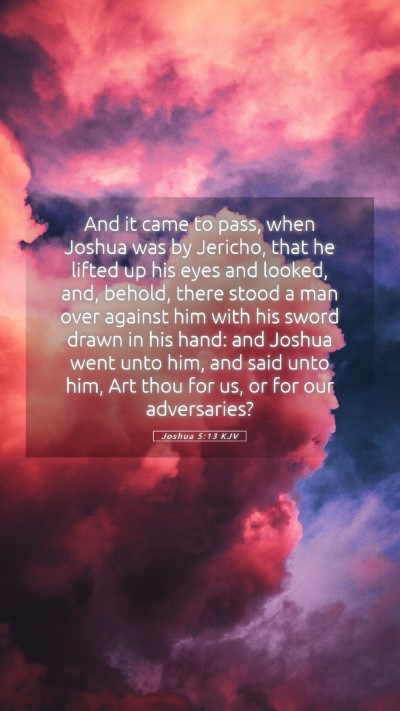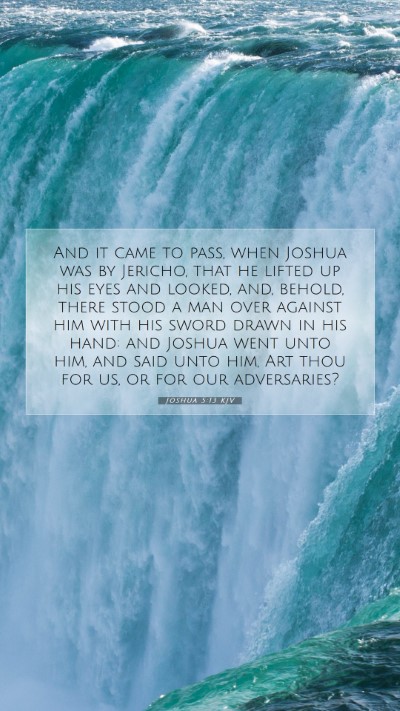Old Testament
Genesis Exodus Leviticus Numbers Deuteronomy Joshua Judges Ruth 1 Samuel 2 Samuel 1 Kings 2 Kings 1 Chronicles 2 Chronicles Ezra Nehemiah Esther Job Psalms Proverbs Ecclesiastes Song of Solomon Isaiah Jeremiah Lamentations Ezekiel Daniel Hosea Joel Amos Obadiah Jonah Micah Nahum Habakkuk Zephaniah Haggai Zechariah MalachiJoshua 5:13 Meaning
What is the meaning of Joshua 5:13?
And it came to pass, when Joshua was by Jericho, that he lifted up his eyes and looked, and, behold, there stood a man over against him with his sword drawn in his hand: and Joshua went unto him, and said unto him, Art thou for us, or for our adversaries?
Joshua 5:13 Bible Verse Meaning
Understanding Joshua 5:13: A Comprehensive Bible Verse Commentary
When searching for Bible verse meanings and Bible verse interpretations, one may encounter Joshua 5:13, a significant text within the narrative of Israel's conquest of Canaan. This verse serves as a vital moment unpacking themes of divine guidance, leadership, and the nature of God in relation to humanity.
Verse Text
“And it came to pass, when Joshua was by Jericho, that he lifted up his eyes and looked, and behold, there stood a man over against him with his sword drawn in his hand: and Joshua went unto him, and said unto him, Art thou for us, or for our adversaries?” - Joshua 5:13 (KJV)
Contextual Background
This verse is set in a critical phase of Israelite history just before the conquest of Jericho. Joshua, the leader appointed after Moses, encounters a mysterious figure that prompts deep reflection and inquiry possibly linked to the upcoming battles and their significance.
- Historical Context: The Israelites have crossed the Jordan River, and Jericho stands as their first major obstacle in the Promised Land. This verse frames Joshua’s leadership and the necessity for divine affirmation.
- Theological Significance: The passage raises questions about allegiance to God and the empowerment He provides, emphasizing God’s sovereignty over both Israel and their adversaries.
Verse Interpretation
Various biblical scholars and commentators have approached Joshua 5:13 from different angles:
-
Matthew Henry:
Henry emphasizes the importance of recognizing God’s presence before engaging in spiritual and physical battles. Joshua's inquiry reflects a profound moment of discernment, illustrating the need for divine direction in every endeavor.
-
Albert Barnes:
Barnes notes that the “man” Joshua encounters is often interpreted as a theophany, a manifestation of God in human form. His drawn sword symbolizes readiness for action and judgment, serving as a reminder that God is ultimately the commander of Israel’s armies.
-
Adam Clarke:
Clarke discusses the significance of Joshua's question about allegiance, suggesting that the true inquiry for each believer lies in understanding whose side they occupy. The drawn sword indicates that there is no neutrality in the spiritual conflict.
Thematic Elements
In this passage, several key themes emerge:
- Divine Guidance: Joshua's encounter stresses the necessity of seeking God’s will when facing challenges, which is crucial in spiritual leadership.
- Preparation for Battle: The drawn sword symbolizes not only readiness for conflict but also the authority that God holds over the outcomes of such battles.
- Spiritual Allegiances: Joshua’s question regarding whose side the figure is on serves as a call for self-examination regarding faithfulness and fidelity to God.
Application for Daily Life
Understanding Scripture often involves contextualizing biblical texts for modern believers:
- Seeking Divine Direction: Like Joshua, individuals today should actively seek guidance from God before making significant decisions.
- Evaluating Loyalties: This verse encourages self-reflection about where one stands in their spiritual life and whom they serve.
- Understanding God’s Power: Recognizing that God holds authority in both struggles and victories can alter one's approach to challenges.
Bible Cross References
- Exodus 23:20-23: This passage discusses God sending an angel to guide Israel, reinforcing the theme of divine guidance.
- Revelation 19:11-16: This passage features Christ as a warrior with a drawn sword, paralleling the symbolism of divine authority.
- Isaiah 54:17: God promises protection against adversaries, resonating with the assurance of His support in conflict.
Conclusion
Joshua 5:13 invites readers to explore deeper Bible study insights and reflect on the nature of God’s involvement in our lives. As individuals engage with Bible study materials and Bible study resources, the lessons from this passage can help facilitate major spiritual growth.
For those engaged in Bible study groups or online Bible study, this passage serves as a profound text for discussion surrounding commitment, leadership, and divine purpose. Understanding Scripture is essential for applying its teachings to one's life.


